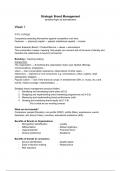Strategic Brand Management
aantekeningen bij lesmaterialen
Week 1
Intro college
Companies protecting themselves against competition over time:
Factories → (physical) capital → patents (intellectual capital) → brands
(Helen Edwards) Brand = Product/Service + values + associations
This combination creates ‘meaning’ that people can connect with at the level of identity and
therefore the relationship is beyond commercial.
Branding = meaning-making
Comes from:
The organisation → Everything the organisation does/ says: Market offerings,
communications, employees,...
Users → Own consumption experience, observations of other users, …
Influencers → Opinions of ‘non-consumers’ e.g. connoisseurs, critics, experts, retail
salespeople, bloggers, …
Popular culture → Use of the brand as ‘props’ in entertainment (film, tv, music, etc.) and
events, media coverage / representation, …
Strategic brand management process (Keller)
1. Identifying and developing brand plans (w3.3)
2. Designing and implementing brand marketing programmes (w3.4-3.6)
3. Measuring and implementing brand performance (niet)
4. Growing and sustaining brand equity (w3.7-3.8)
This is what we are working towards
What can be branded?
Companies, people (Ronaldo), non-profits (WWF), profits (Nike), experiences, events
(festivals), arts (Harry Potter), countries, educational institutions (IDE)
Benefits of Brands to Organisations
- Recognition/ identification - Loyalty
- Differentiation - Status/ legitimacy
- Legal protection - Financial return
- Choice/ preference - Resilience
Benefits of brands to consumers
- Source identification - Quality signal
- Ease of decision making - Reassurance
- Risk reduction
,Consumer value that goes beyond value-in-exchange
- Task performance
- Self expression / identity
- Connection - ‘third place’
Holbrook’s typology of Consumer Value
What outcomes do consumers seek/ derive from the consumption experience?
Focus areas
- Efficiency: input/ output, convenience
- Excellence: quality
- Status: success, impression management
- Esteem: reputation, prestige
- Play: fun
- Aesthetics: beauty
- Ethics: virtue morality, justice
- Spirituality: faith, ecstasy, sacredness
, Brand Management Book - Chapter 1
Definition of a Brand: (Aeker, 1991) a “distinguishing name and/or symbol intended to
identify the goods and services of one seller and to differentiate those goods and services
from those of competitors.”
(Keller, 1993) describes branding as the creation of awareness, reputation and prominence. /
the differentiation from other products and services designed to satisfy the same need
(Kotler et al., 2020) describes branding as a name, term, symbol, or design, or a
combination of them all, intended to signify the goods or services of one seller or group of
sellers and to differentiate them from those of competitors
there are many many definitions of a brand
Brand = a noun, it is something physically present, like a car or a mobile phone.
The brand goes beyond just a product that can be held by a brand user. It sometimes comes
in the form of services that are experienced by brand users.
Branding = a verb, is a marketing practice in which a brand owner takes responsibility for
enhancing the experience of those they engage with.
Brand management = a process which produces rewards over time. It’s a long-term effort
to make the brand stand out and attract and retain loyal users. It bridges the gap between
brands (the noun, the physical thing) and branding (the verb, the process). It ensures value
is added to the brand through a creative process.
A brand needs branding to become a valued brand and the overall process needs brand
management to succeed.
Logo = a visual identity of a brand
Stakeholders who are involved with the brand management process
and recognise their roles in shaping the brand meanings and values, identity and reputation
1. Brand Owner = is the entity or person that has the legal and official possession of a
brand.
2. Brand Users = are the people who use the product(s)/service(s) of a company
3. Brand Managers = are responsible for managing the branding process of the brand
4. Brand Influencers = are people who have attained celebrity status in society. They
command huge followers on social media and in real life
5. Brand Valuers = are companies or individuals responsible for estimating and
calculating the financial worth of a company. They also do consider the future worth
of a brand based on some factors that could dictate the market.
Brand Ownership = a concept that centers on responsibility for creating, developing and
sustaining a brand. It basically identifies the individual or organisation that owns a brand.




